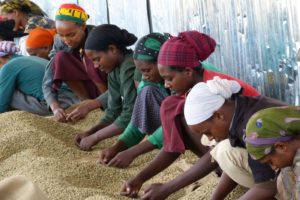ESAT News (June 19, 2017)

Rising temperatures is threatening to make half of the coffee growing regions in Ethiopia unsuitable for coffee with some areas already destroyed by the global warming phenomenon.
A research published online today by the journal Nature Plants warns unless efforts are made to move coffee production to higher places where it is suitable to grow, the country’s cash crop could be seriously affected with global consequences of the production and quality of the bean.
“Against a backdrop of rapidly increasing temperatures and decreasing rainfall, there is an urgent need to understand the influence of climate change on coffee production,” the study says.
The research reveals that considering the current rise in global warming, upto 60% of Ethiopia’s coffee growing regions could become unsuitable for coffee.
The research, quoting other data, says in 2015/16, Ethiopia exported around 180,000 metric tonnes of coffee at a value in excess of 800 million USD, making it Africa’s largest coffee producer and the world’s fifth largest coffee exporter, despite the fact that around half of the coffee produced each year is consumed in-country.
The study also says coffee farming provides a livelihood income for around 15 million Ethiopians (16% of the population), based on four million small-holder farms.
No comments:
Post a Comment